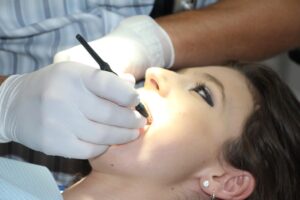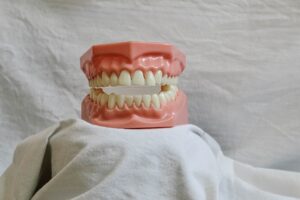Pediatric Dentistry
What is Pediatric Dentistry?
Pediatric dentistry is the specialty of dentistry that deals with the oral health of children up to the age of 18.
At Birbe Clinic we maintain the oral health of children and young people. We achieve this by carrying out good prevention and early detection of any problems that may appear.
The oral health of our young people in good hands and at the right time.
Our Treatments
- First and foremost, the prevention of dental caries.
- We teach oral hygiene along with proper dietary habits.
- Radiology and complementary diagnostic tests.
- Fillings with the most suitable materials.
- We guide tooth replacement and occlusion development (space maintainers).
- Detection of dental malposition.
- Detection of facial bone growth alteration.
- Dental traumatology.
- Guidance on bad habits such as thumb sucking or pacifier use.
- Guidance on the need or not for orthodontic treatment and conscious sedation.
Questions about the oral health of the little ones.
A toothbrush will remove plaque bacteria that can lead to tooth decay.
Any soft toothbrush with a small brush head, preferably a special infant toothbrush, should be used at least once a day before bedtime.
To prevent dental problems, your child should see a pediatric dentist when their first tooth appears, or no later than their first birthday.
Pediatric dentists are the pediatricians of dentistry. A pediatric dentist is a dental graduate with postgraduate training specializing in the treatment of oral health problems in children and adolescents.
Visiting the website of the Spanish Society of Pediatric Dentistry (SEOP) or consulting the Official College of Dentists and Stomatologists of Catalonia (COEC).
Baby teeth, also called primary, deciduous or temporary teeth, are of great importance for many reasons: they allow children to perform fundamental functions such as phonation (speaking) and chewing; they also help, during tooth replacement, for the permanent teeth to follow the right path and, very importantly, they maintain the space so that they can be well aligned with each other, avoiding crowding and other malocclusions.
First, clean the irritated area with warm water and salt and place cold on the face if it is swollen. Give the child paracetamol for the pain, instead of placing aspirin on the teeth or gums. And see a pediatric dentist as soon as possible.
Generally, both thumb sucking and pacifier sucking, if prolonged for a long period of time, favor the appearance of dental malpositions and bone malformations of the jaws.
Most children stop these habits on their own, but if they are still present at the age of 3, the pediatric dentist should recommend the fitting of an oral appliance to eliminate them as soon as possible.
Avoid using a bottle when the child goes to sleep. When they are of a certain age, months, avoid night feedings or water only.
It is also essential to learn the correct way to brush and floss your teeth.
Take your child to a pediatric dentist regularly to have his or her teeth and gums checked.
The first dental visit should be scheduled around your child’s first birthday.
A checkup every six months is recommended to prevent cavities and other dental problems. However, your pediatric dentist can tell you when and how often your child should be seen, customized to your child’s oral health and risk for cavities.
The sooner the better!
From birth, clean the baby’s gums with an infant toothbrush or a soft cloth and water.
When the first baby teeth have appeared, parents should use a small amount of fluoride toothpaste (from “staining” the bristles of the toothbrush to the size of a grain of rice), brushing twice, using a soft, age-appropriate toothbrush.
Once children are between 3 and 6 years old, the amount of toothpaste should be increased to the size of a pea and perform or assist your child’ s tooth brushing. Remember that young children do not have the ability to brush their teeth effectively. Children should spit out and not swallow excess toothpaste after brushing.
Make sure your child has a balanced and varied diet, which includes a portion of each of the following foods: fruits and vegetables, bread and cereals, milk and dairy products, fish/meat and eggs.
Limiting sugar and starch helps protect your child’s teeth against cavities.
You can also ask your pediatric dentist which foods help protect your children’s teeth.
Pit and fissure sealants are tooth-colored composites used for filling natural “cracks” in the chewing surfaces (occlusal surfaces) of teeth, mainly molars and premolars.
This facilitates the hygiene of the occlusal surfaces of the molars (surfaces with the highest incidence of caries) and avoids the retention of plaque and food residues in these areas.
The application is fast, comfortable and can effectively protect teeth for many years. It is performed without anesthesia.
Mouthguards should be worn to protect teeth, lips, cheeks and gums from sports-related injuries.
A mouthguard custom-made by your pediatric dentist for your child will protect teeth and mouth from bumps and falls during sports activities
The most important thing is to remain calm. Then look for the tooth. Hold it by the dental crown, do not touch the root, and try to put it back in its socket. If this is not possible, put the tooth in a glass of milk or salt water and take your child immediately to the pediatric dentist.
Absolutely safe. There is very low exposure in dental x-rays. Pediatric dentists are especially careful to limit the amount of radiation to which they expose children. Lead aprons and digital radiology are used to ensure safety and minimize the amount of exposure.
Parents should take their children to the dentist regularly, starting with the eruption of the first tooth. The pediatric dentist can recommend a specific program of brushing, flossing and other treatments and tips to supervise and teach your child. This home care, in addition to regular dental visits and a balanced diet, will help your child lead a healthy life and healthy habits.
Why have surgery at Birbe Clinic?
We specialize in designing faces and smiles.
At Birbe Clinic we have a great team, supervised by Dr. Joan Birbe, with more than 20 years of experience treating patients; always up to date with the latest developments and selecting the innovations that really bring improvements to our treatments. As in the case of virtual simulations of facial surgeries, intraoral scanners, customization of facial prostheses, the use of the microscope, etc.
Our recommendations
Testimonials
Our priority is to achieve excellence in treatment. All this with a personalized, honest and trustworthy treatment. In addition, our facilities offer maximum hygiene, sterilization and comfort.
Find out what they think about us!
"I would like to highlight the great professionalism and warmth of all the staff at the BIRBE clinic. And regarding Dr. Muñiz, who is the one who attends and follows up my son's treatment, I can only say that I feel in very good hands, and that the visits are always very complete, providing all the necessary information and explanations. Thanks to the whole team."
We help you to perform the intervention you need
After a rigorous evaluation, we offer you a personalized and closed budget with all the necessary forms of payment and financing, so that you can carry it out.
Contact
with us
Contact us during our business hours:
- Monday, Thursday and Friday from 8:00 a.m. to 4:00 p.m.
- Tuesday and Wednesday from 8:00h to 19:00h.
- Phone: +34 93 212 47 37
Outside our working hours you can send us a WhatsApp or a form and we will get back to you the next business day. Being located in Barcelona, we receive patients from all over the national and international territory.
During your first consultation we will provide you with:
Personal diagnosis by oral and facial examination.
Closed budget with different financing financing possibilities.




